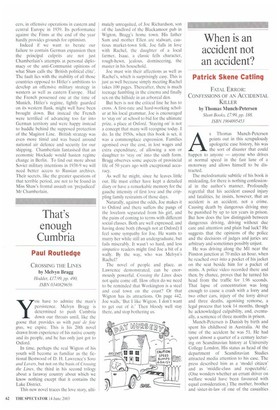Beating the old man with his own umbrella
Graham Stewart
THE BRITISH POLITICAL ELITE AND THE SOVIET UNION,
1937-1939
by Louise Grace Shaw Frank Cass, £39.50, £18.50 (paperback), pp. 210, ISBN 071465398510714683337 (paperback) Cmild Hitler have been stopped, or at least beaten more quickly? Given the catastrophe of the second world war, historians can he forgiven for piling in to play this particular parlour game. Some believe the optimum opportunity was lost at Munich, others go further back to the remilitarisation of the Rhineland. If only Lord Howard de Walden's heir, motoring through Munich in 1931 on a detour between Eton and Magdalene, had made a better job of running over the future Fuhrer who, with mind elsewhere, stepped out into his path without looking ...
Fate can rest in unlikely hands and the distance between the break and the accelerator is a short one. But historians cannot easily factor such possibilities into their evaluation. Yet this is precisely why they should occasionally check themselves when seized by the temptation to adopt a tone of lofty self-certainty. Louise Grace Shaw, in this her first book, appears to have the latter in abundance.
It is her contention that Britain had a real opportunity to conclude a military alliance with the Soviet Union in 1939 and that, despite the increasing willingness of his Cabinet colleagues, Neville Chamberlain deliberately squandered it because of his 'prejudice' against Stalin.
We will have to put aside the question of whether a little prejudice against this monster suggests that the man from Edgbaston was a judge of character after all. The stakes were so high that realpolitik should have been the only consideration. When Britain's survival depended upon it, even a tub-thumping anti-Bolshevik like Churchill believed that 'if Hitler invaded hell I would make at least a favourable reference to the devil in the House of Commons'. And, in the end, we did need the massed Soviet divisions to role the Wehrmacht back. The price paid for this was the communist occupation of eastern Europe — the price Chamberlain feared was involved in concluding a deal with Stalin in 1939. The dif
ference between the Churchill and Chamberlain positions was the number of lives lost before this inevitability was accepted.
Given this, it should be more readily understood why Chamberlain hoped for an alternative way out in the accommodation of Hitler's more limited stated objectives through diplomacy. Hitler, of course, transpired not to have limited objectives and consequently appeasement is now a dirty word. But those who rage about Chamberlain's betrayal of Czechoslovakia at Munich in 1938 are frequently indifferent about the pro-war party's alternative of handing over all the countries of eastern Europe to the Red army.
This was a 'liberation' the Czech and the Polish governments had made absolutely clear to London they would not accept. Their politicians, men like Benes and Beck, knew that, with victory, the Communists would be as slow to go home as the Nazis. After all, it was only in 1920 that the Poles had managed to push the advancing Red army back from the gates of Warsaw. An Anglo-French-Soviet alliance that disregarded such expressed wishes actually risked pushing the fearful Poles towards strengthening their nonaggression pact with Berlin, a course adopted by Latvia and Estonia — countries which were rightly nervous of Soviet intentions. Rebuffed by Chamberlain, it was the Soviets who signed the German nonaggression pact that really sealed eastern Europe's fate. 'Chamberlain had convinced himself that Hitler shared his antiSoviet prejudices to the extent that he too allowed distrust and hatred to dictate foreign policy decisions,' says Shaw, beating the old man over the head with his own umbrella.
One can huff and puff as much as one likes, but it is no good claiming that Britain's offhand style of negotiating with Molotov effectively forced the Soviets into this Faustian compact. The slow pace of the British mission under Admiral Drax was designed less to frustrate agreement than to prevent early collapse. Not only had Poland still not given permission for the Red army to cross her frontier in the event of a German invasion, Beck was maintaining that such an undertaking would actually hasten a German assault. Ultimately, Molotov wanted a deal that it was outside Britain's powers (moral and strategic) to deliver. But it was not outside the powers of like-minded totalitarians in Berlin.
We will never know if a different sort of Anglo-French alliance with Stalin — one that had Poland's blessing — could have succeeded_ The answer depends upon the effectiveness of the Red army, seriously undermined by Stalin's purge of its offi curs, in offensive operations in eastern and central Europe in 1939. Its performance against the Finns at the end of the year hardly provides grounds for optimism.
Indeed if we want to berate our failure to contain German expansion then the principal culprits are not just Chamberlain's attempts at personal diplomacy or the anti-Communist opinions of what Shaw calls the 'British political elite'. The fault lies with the inability of all those countries opposed to Hitler's ambitions to develop an offensive military strategy in western as well as eastern Europe. Had the French possessed one at the time of Munich, Hitler's regime, lightly guarded on its western flank, might well have been brought down. But instead the French were terrified of advancing too far into German territory and were happy instead to huddle behind the supposed protection of the Maginot Line. British strategy was even more timid and was based around national air defence and security for our shipping. Chamberlain fantasised that an economic blockade would hasten regime change in Berlin. To find out more about Soviet military intentions in 1938-9 we will need better access to Russian archives. Their secrets, like the greater questions of that terrible period, are not to be found in Miss Shaw's frontal assault on 'prejudiced' Mr Chamberlain.



































































































 Previous page
Previous page